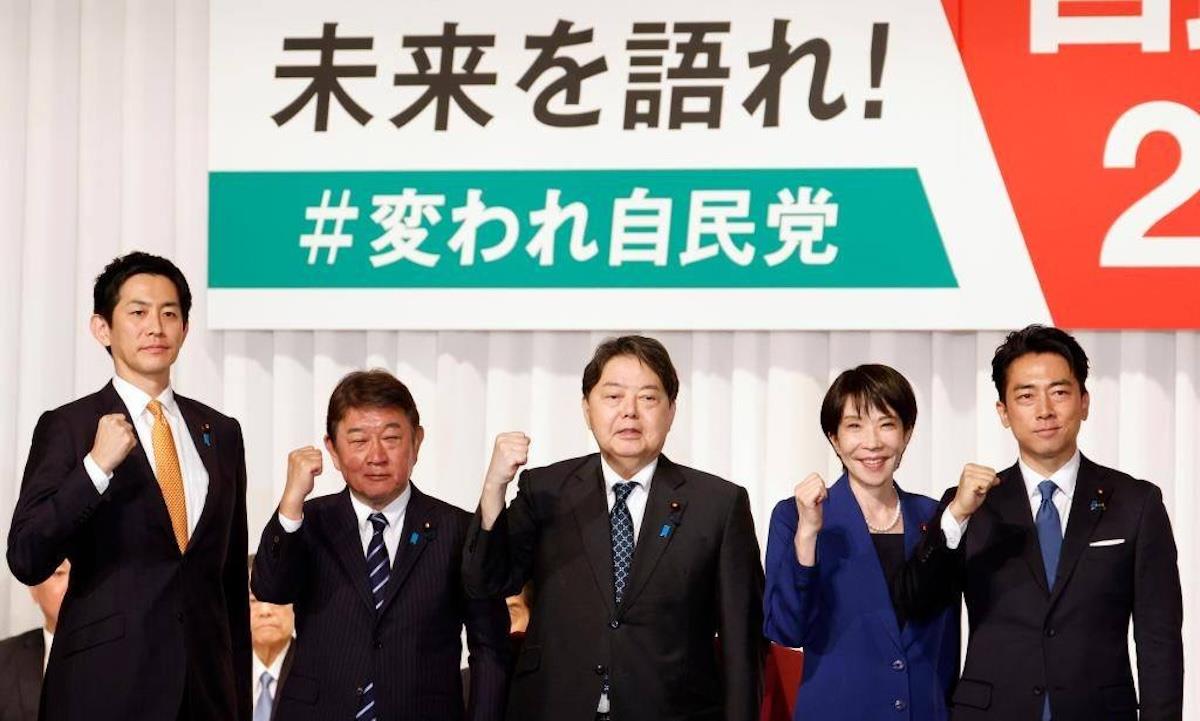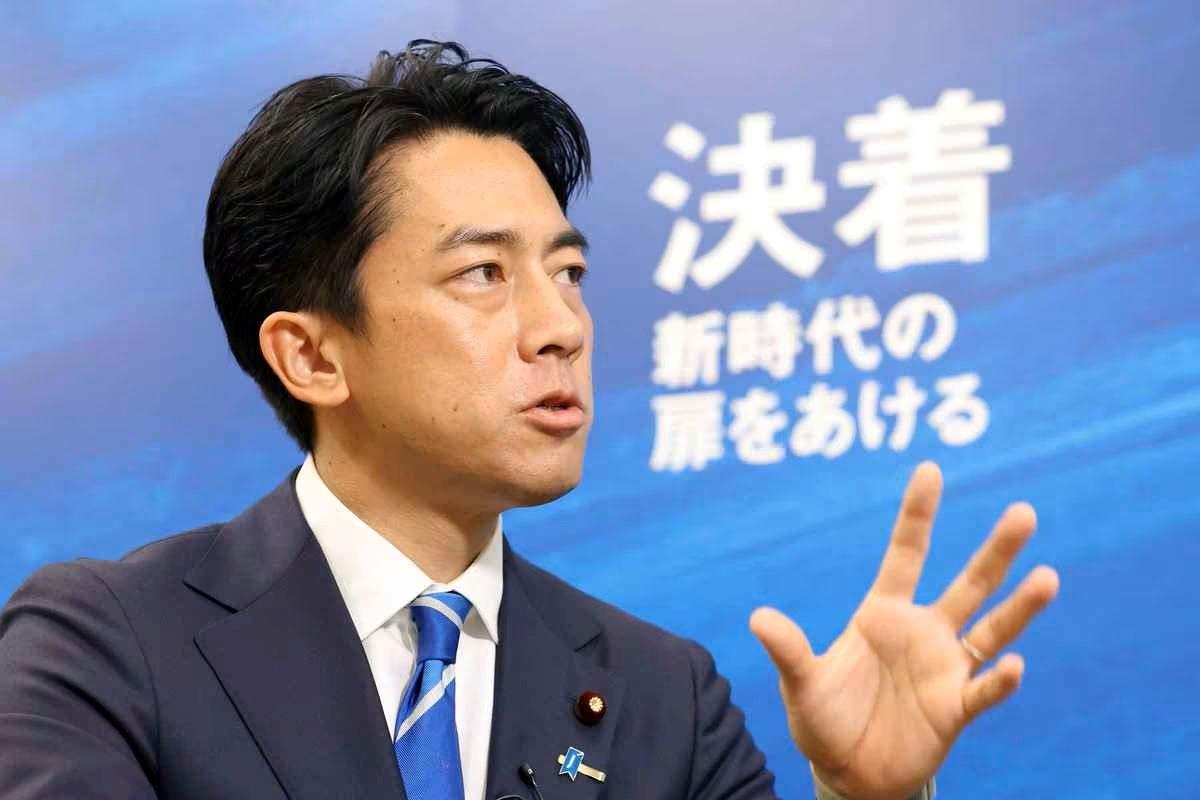Japan Poised For A No-Change, Nepo-Baby Premiership
It's not that a critical mass of Japan's 125 million people seem enthusiastic about the 44-year-old son of 2001–2006 leader Junichiro Koizumi taking a turn running Asia's No 2 economy. It's more that the politically moderate, generally inoffensive scion of a family dynasty looks like the least worst option to replace Shigeru Ishiba .
Luckily for Koizumi, he steps into some rather small shoes. One has to get extremely creative to argue that Ishiba achieved much during his 11-plus months in the premiership.
Ishiba spent most of his time explaining his latest U-turn from previously held policy positions. He never found his groove with voters, something painfully clear following the Liberal Democratic Party's disastrous showing in July 20 elections.
Koizumi is almost certain to score far higher approval ratings just because he's not Ishiba. But investors might be wise to lower their expectations that Koizumi will achieve much of anything on the economic reform front should he win the party election on October 4.
For one thing, he'll have to last longer than the 12 months most Japanese leaders get in office. If he does, only then might the political establishment entertain any new ideas Koizumi has to raise Japan's competitive game.
Already, he faces great skepticism about what many voters see as a nepo-baby premiership. Koizumi also will have to act boldly to outdo his father's reform successes two decades ago. While Shinzo Abe often gets the laurels, it was the five years his mentor Junichiro Koizumi spent at the controls that put the imperative for disruption on the table in Tokyo.
When he became prime minister in 2001, Japan was at the height of its deflation era. The banking system was on the verge of collapse as bad loans from the 1980s“bubble economy” period overwhelmed balance sheets. In the early 2000s, Koizumi and his economic czar, Heizo Takenaka , prodded banks to dispose of the non-performing loans they had been carrying on their books for over a decade.
Koizumi pulled off the audacious privatization of the sprawling Japan Post, which ran the globe's biggest savings bank. Its scale big-footed local banks and made Japan less appealing to international institutions looking for growth markets. It also funded complacency and dodgy dealing as politicians tapped the bank's funds to finance their pet projects.
Yes, the privatization took too long and subsequent governments worked to water it down. But getting the postal savings system out of government hands was a game-changer. So was Koizumi's focus on reducing the massive public works projects that generated the developed world's biggest debt load.
In 2006, Koizumi passed the baton to protege Abe, who put the economic reform process on the shelf. Within 12 months, the revolving door came for Abe. And for the next several prime ministers, all of whom lasted around 12 months.
In December 2012, Abe returned to the premiership with far more ambitious plans than six years earlier. Yet his“Abenomics” program was too hit-and-miss to alter Japan's growth model.
Latest stories
China's K-visa woos STEM talent put off by H-1B fee hikes

Asia's youthquake: India's Gen Z protests are boiling over

Japan's LDP leadership race, so far, is a sluggish campaign
Abe's reforms did strengthen Japan's corporate governance, prodding companies to increase returns on equity, diversify board rooms and unwind cross shareholdings among friendly companies.
Mostly, though, Abe punted on the difficult upgrades. Rather than cut bureaucracy, loosen labor markets, increase productivity , catalyze a startup boom and empower women, Abe relied on aggressive monetary easing. The Bank of Japan cornered the bond and stock markets, sending the yen 30% lower versus the US dollar.
That drained Abenomics of all potency. Ultra-loose monetary policy removed all urgency for government officials to create more economic energy from the ground up, rekindle innovation and attract more foreign talent to augment an aging, shrinking workforce. It took the onus off CEOs to invent, restructure and swing for the fences.
Now, the BOJ is struggling to find an exit after 24 years of quantitative easing (QE). In January, Governor Kazuo Ueda managed to hike rates to a 17-year high of 0.5.%. Since then, the BOJ has held rates steady amid concerns about US tariffs slamming growth. At present, even Japan's government thinks the economy will grow just 0.7%, at best, in 2025.
The BOJ has been tapering its bond purchases. And now, stocks, too, as the BOJ throttles back on is titanically large holdings of exchange-traded funds.
“The decision to unwind ETFs ends years of uneasy limbo,” says Stefan Angrick, economist at Moody's Analytics.“The BOJ had effectively stopped buying ETFs in 2022. It would have likely done so even sooner, had the Covid-19 pandemic not forced the bank back into easing mode.”
Most of the $251 billion ETFs on its books were bought under former Governor Kuroda Haruhiko, when he pushed Japan's QE into uncharted territory.
Unlike bonds, ETFs don't roll off the central bank's balance sheet over time. This, Angrick says,“prompted a wide range of proposals on how to deal with them, from selling to government investment funds, distributing them to households, or leveraging them to build a reserve against future bond losses. Until recently, Governor Ueda Kazuo brushed off questions on the issue.”
Yet Ueda's ability to push ahead with more quantitative tightening (QT) depends on the trajectory.
Odds are not great that a change in government will result in a significant change in policy direction. Koizumi's economic views, after all, aren't well known. That likely means more continuity from the Ishiba premiership and that of the 2021-2024 Fumio Kishida period or that of Yoshihide Suga (2020-2021) before him.
The other frontrunner, Sanae Takaichi , a former economic security minister, would be Japan's first female leader. Takaichi, 64, is a staunch supporter of Abenomics. In other words, more of the same moves Tokyo has been trying since 2012 to minimal effect.
The trouble with Abenomics, remember, is that it's nothing new or innovative. Just a list of steps Japan should've taken a decade or more earlier. The idea of doubling down on failure might not sit well with international investors.
The other worry is that the LDP has had to join hands with opposition parties to maintain governing control. The quid pro quo is tax cuts that would increase Japan's debt-to-gross-domestic-product ratio. All this has the so-called“bond vigilantes” pushing bond yields higher.
“A challenging fiscal road lies ahead for the next prime minister,” says David Boling, analyst at Eurasia Group.“The new leader will inherit a challenging fiscal position. Markets are growing more anxious about Japan's debt path, with recent long-term debt auctions seeing weak demand amid rising uncertainty about the Bank of Japan's interest rate normalization process.”
Boling says a“Koizumi win will be seen as continuity of current economic policy, whereas markets may react with more volatility if Takaichi prevails, given her support of Abenomics - loose fiscal and monetary policy.”
Koizumi's“political skills, however, remain a watch point,” Boling explains.“Labeled a policy lightweight by some, Koizumi's poor debate showing in the 2024 LDP race cost him support, dropping him from frontrunner to third among nine candidates. Rivals will again target his inexperience in the upcoming debates.”
This could open an opportunity for other candidates, namely Chief Cabinet Secretary Yoshimasa Hayashi ; former Minister for Economic Security Takayuki Kobayashi; and former LDP Secretary-General Toshimitsu Motegi.
None of these lawmakers has displayed flashes of reformist energy. Pretty much everywhere economists turn in Nagatacho, Tokyo's Capitol Hill, they find a possible prime minister keen to stick with the same policies as Ishiba, Kishida, Suga and the late Abe.
Just about the only real drama about the race for LDP party leader is when he or she night call a national election.
“Regardless, the next prime minister would still face the same problematic legislative dynamics as Ishiba, unless a bigger coalition is formed,” writes Fitch Group advisory BMI.

Sign up for one of our free newsletters
-
The Daily Report
Start your day right with Asia Times' top stories
AT Weekly Report
A weekly roundup of Asia Times' most-read stories
“We thus see a possibility that a new LDP premier could seek to take advantage of their putative honeymoon period to call a snap general election, with the aim of at least recovering the LDP's majority” in parliament.“Even so, this would be a gamble, as Ishiba himself discovered when he inadvertently led the LDP into a lower house minority position in October 2024.”
When it comes to fiscal loosening, Takaichi scares the bond market more than Koizumi. Economist Yusuke Matsuo at Mizuho Securities says that signs of a Koizumi victory would trigger unwinding of“Takaichi trades” betting on a weaker yen, a steeper Japanese government bond yield curve and higher stocks.
Perhaps realizing this, Matsuo notes, Takaichi may be moderating her expansionist bias by“steering clear of directly commenting on BOJ monetary policy or the possibility of lowering the consumption tax rate.”
Given Japan's 3%-plus inflation rate, increased stimulus could backfire if bond traders send yields higher.“The fact there was so much debate about inflation shows many board members are worried about upward price risks,” says Mari Iwashita, strategist at Nomura Securities.
There are indeed some enviable things going on with Japan's economy. One is a huge tourism boom pulling tens of millions of visitors to Japan every year. The nation also is getting serious about the cultural export industry.
Along with creating jobs and pulling in hard currency, Sho Nakazawa, an economist at Morgan Stanley, notes that growth of the content industry“also enhances Japan's soft power. Branded IPs [intellectual properties] themselves function as barriers to entry, reinforcing competitive advantage.”
Nakazawa adds that“we view the coming decade as a prime opportunity for Japan's soft power industries to scale, including new businesses born from collaborations between content and non-content sectors.”
Beyond content, he adds, Japan possesses abundant intellectual assets -its cuisine, natural landscapes, traditional culture - that can be mobilized as IP. Companies that leverage these assets to drive cross-sector innovation and deliver elevated experiential value to a deepening, multi-layered base of 'Japan fans' are poised for growth,” Nakazawa says.
Yet Japan's troubles are deepening at home and abroad, ensuring the next prime minister won't enjoy much of a honeymoon period. Or, for that matter, decent odds of righting an underperforming economy.
Follow William Pesek on X at @WilliamPesek
Sign up here to comment on Asia Times stories Or Sign in to an existing accoun
Thank you for registering!
An account was already registered with this email. Please check your inbox for an authentication link.
-
Click to share on X (Opens in new window)
X
Click to share on LinkedIn (Opens in new window)
LinkedIn
Click to share on Facebook (Opens in new window)
Facebook
Click to share on WhatsApp (Opens in new window)
WhatsApp
Click to share on Reddit (Opens in new window)
Reddit
Click to email a link to a friend (Opens in new window)
Email
Click to print (Opens in new window)
Print

Legal Disclaimer:
MENAFN provides the
information “as is” without warranty of any kind. We do not accept
any responsibility or liability for the accuracy, content, images,
videos, licenses, completeness, legality, or reliability of the information
contained in this article. If you have any complaints or copyright
issues related to this article, kindly contact the provider above.
Most popular stories
Market Research

Stratx Launches Compliance-Aware Routing Protocol For Stablecoins, Rwas, And Cross-Border Settlement
- Kucoin Appeals FINTRAC Decision, Reaffirms Commitment To Compliance
- FBS Analysis Shows Ethereum Positioning As Wall Street's Base Layer
- VCUK Launches New Private Equity And Venture Capital Initiative With A Focus On Europe
- Zebu Live 2025 Welcomes Coinbase, Solana, And Other Leaders Together For UK's Biggest Web3 Summit
- Betfury Is At SBC Summit Lisbon 2025: Affiliate Growth In Focus
- Moonx: The Leading Crypto Trading Platform With X1000 Leverage And Unlimited Meme Coin Access





















Comments
No comment